Average sizes and life expectancy for this breed:
The Bichon Frise is one of the most famous and easily recognisable dog breeds in the world. They are loveable dainty dogs that are known for their delightful, loving, and adorable natures. Bichon Frise are lively and cheerful which makes them great family dogs because they enjoy attention from kids of all ages. This is another advantage of this breed as a lot of smaller dogs find it difficult to handle the rowdiness of kids at home.
This breed is believed to have originated in the Mediterranean and is often called the "Tenerife Dog." Brought by sailors in the 14th century from Tenerife's island, Bichon Frise found their way into the homes and hearts of dog lovers around the world.
The Bichon Frise adores being the centre of attention. They are very confident, outgoing, and highly intelligent, which makes them a joy to be around. This dog breed is family-oriented, very sociable, very affectionate, and gentle. This makes Bichon Frise a faithful lap dog and loving companion.
Furthermore, the Bichon Frise is an ideal pet for any family or individual, whether you live in an apartment in the city or a big countryside home.
See available puppies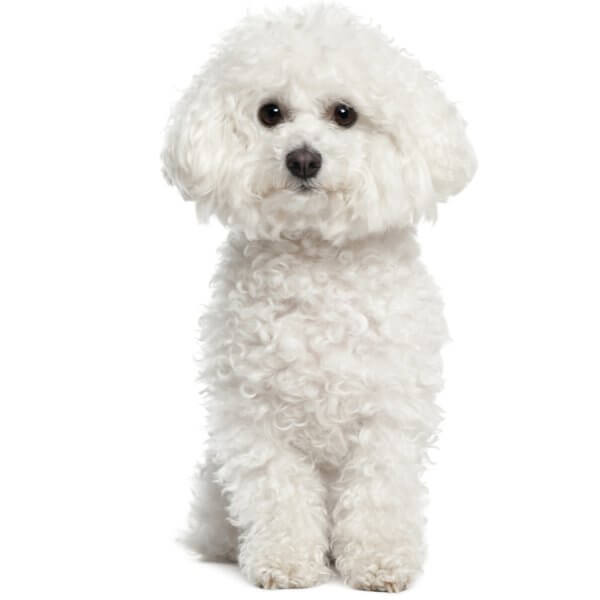

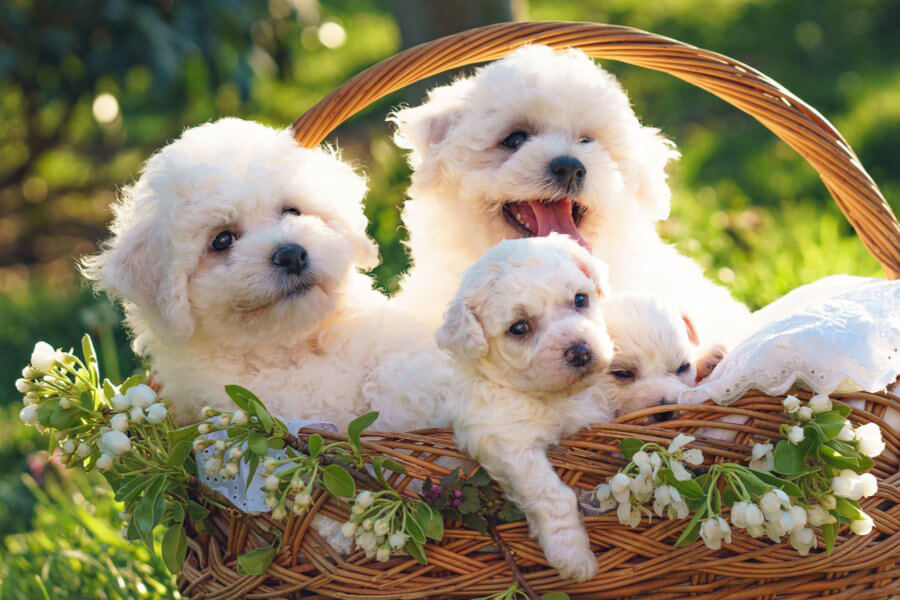


The Bichon Frise (pronounced bee-shon free-zay) is believed to be a descent of the water spaniel and originated in the Mediterranean region. However, their exact origin is obscure. Some historians consider that the Bichon Frise originated in the Canary Islands and was carried to Europe by sailors. Small white lapdogs were thought to be the favourite of Cleopatra according to legend. However, there’s no evidence to suggest that these were Bichon Frise dogs.
Barbichon dogs, including the Maltese, Bichon Frise, and the Havanese, are thought to have first been developed in Tenerife. One of these breeds became so strongly associated with the island that they became known as Bichon Tenerife. These are believed to be the ancestors of the modern Bichon Frise we know today.
These dogs really came into their own in the 13th Century where they became popular companions for members of the royal courts in Spain, France, and Italy. We know these dogs had a reputation for being royal lap warmers because they show up in many royal paintings from that period, including the well-known Titian portrait of Federico Gonzaga, the Duke of Matua.
Elaine Waldorf Gewirtz of the AKC Gazette once wrote:
“King Henry III of France (1574–1589) was so enamoured of his Bichons that he carried a few whenever he went in a tray-like basket suspended by neck ribbons. Recognizing a trend, the court ladies adopted the same odd form of transport.”
In the 19th century, their popularity decreased, when they were often street dogs or circus performers. However, they rose to fame again after World War I.
In 1956, the Bichon Frise was first carried to the United States by a French family named Picault. The dog breed was documented in 1973 by the American Kennel Club as a non-sporting dog. The breed was first introduced in the UK in 1973 when breeders brought their dogs over from America.
Today, Bichon Frises are prized for their adorable appearance and lively characters. They do well in the show ring as well as being beloved family companions.
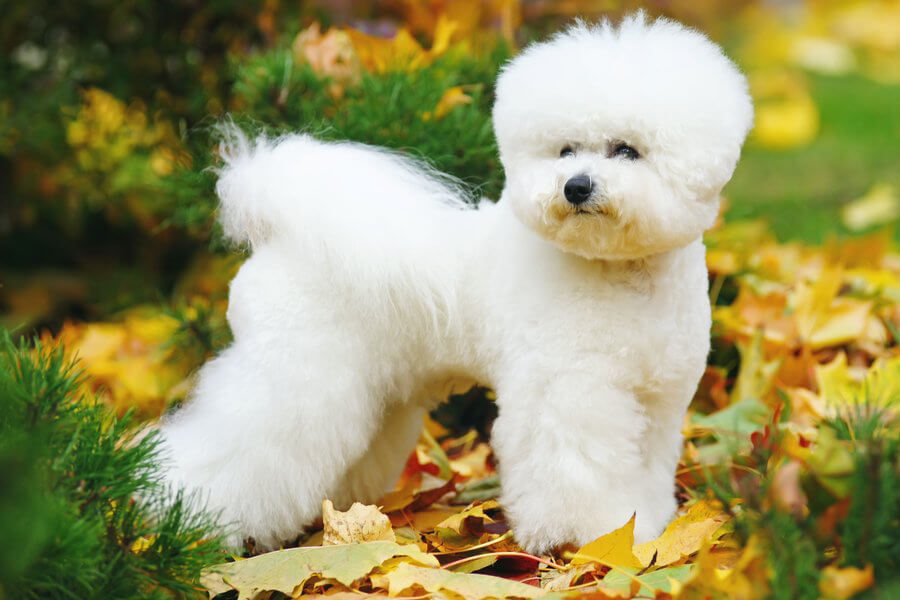
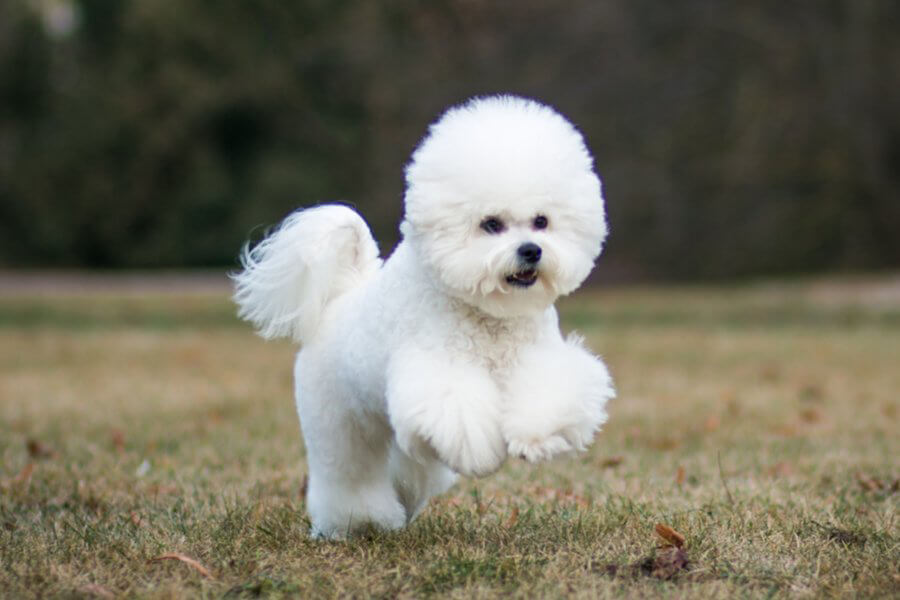
The Bichon Frise has a pure white double coat, consisting of a soft under coat and a coarser outer coat filled with soft corkscrew curls. They are compact and well-proportioned small dogs. Their heads are somewhat rounded with hair that highlights their heads' shape. They have big, black, soft, and shiny noses that add to their overall adorable appeal. A Bichon Frise's eyes are dark and round, emphasizing some striking black rims enclosed by haloes. These dogs have an eager and alert expression in their eyes that people find very endearing.
Their ears are well-covered with extended, flowing hair. The ears hang close and high on the head. The Bichon Frise has a sturdy jaw, flaunting a perfect scissor bite. Their lips are black in colour and relatively tight.
Bichon Frise have long necks that are somewhat arched, giving them their characteristic proud appearance. Their shoulders are sloped with good straight strong legs. They have well-toned bodies, and their feet are well-rounded with black nails and pads. Their plush tails are carried raised and curl gracefully over the back.
The coat of the Bison Frise should be pure white with black, blue, or beige markings on the skin underneath. However, apricot markings are acceptable in pups under 18 months of age.
The Bichon Frise is famed for being cheerful, active, and fun-loving. They are also very confident and outgoing, always friendly and endearing. They love to be the centre of attention!
These dogs hardly ever show any sort of aggressive behaviour however, they do have a strong territorial streak. They can often come across as comical and they enjoy nothing more than to please their owners. They are intelligent dogs, so they tend to learn new things quickly. However, they do have a stubborn and mischievous streak, so training is essential.
While they are active and energetic, Bichon Frise don’t need a massive amount of exercise. So, they make good apartment dogs. Around 30 minutes a day is suitable for this breed. They are especially good around children. However, bear in mind that these bold dogs are not afraid to voice their displeasure if they are handled incorrectly.
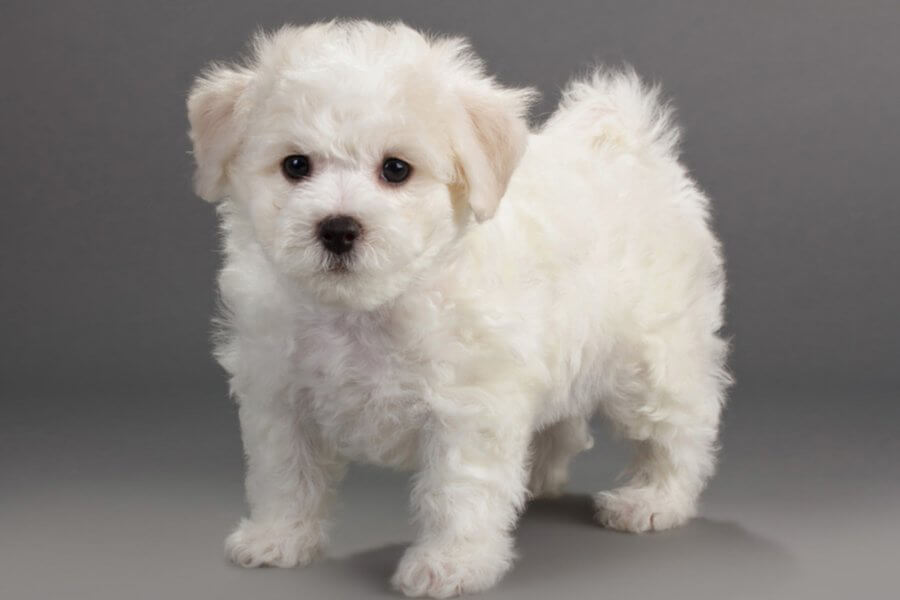
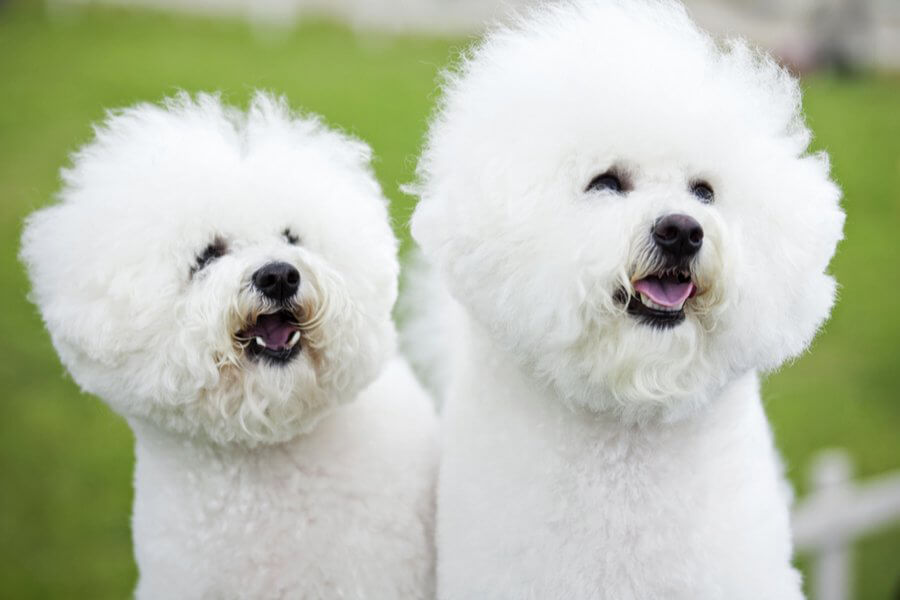
These dogs make a good pet choice for older owners, particularly in environments where someone is home for most of the day. These dogs love a cuddle and have low energy needs.
The Bichon Frise is a very intelligent and confident little dog. However, note that their training needs to begin at puppyhood. Puppies need to be properly socialised at a young age to become well-balanced and well-rounded dogs. It would be a lapse on your part as a dog owner to "spoil" a Bichon Frise just because they are so loveable and charming. Being trustworthy, consistent, and having sufficient time to train a Bichon Frise are the keys to success. Use positive reinforcement methods and make sure your dog knows their place in the pack. Otherwise, they can turn into yappy little tyrants!
It’s worth mentioning that these dogs can be difficult to house train because they are known to be stubborn. They also have small bladders due to their size. A strict bathroom schedule is essential for this breed.
Adult Bichon Frise are well-known for their white, wool-like coats. However, puppies can also have overtones of other colours – like grey, apricot, or buff. The trademark curls of this breed catch the shorter undercoat as it moults. This means that they don't shed as frequently as other breeds. Although these dogs are classed as hypoallergenic, it's important to remember that no dog is 100% hypoallergenic. So, always exercise caution if you have an allergy to dander.
Bichon Frise should be brushed daily if possible. However, once every other day is ok. You shouldn’t brush their coat when it’s dry because it can be prone to pulling and snapping. Either give your dog a bath prior to brushing or dampen their fur with a water spray. Then, use a pin brush and a greyhound comb to brush in downward strokes from their shoulders to their tail. If you choose to bathe your Bichon Frise, dry them lightly with a towel until they are just damp before brushing. Don’t bathe your dog more than once every couple of weeks because this can cause the skin to dry out.
In addition to brushing and bathing, your Bichon Frise will require regular trips to a professional groomer. They will be able to eliminate hair from the ears, allowing air to circulate this area more freely and reduce the risk of health issues such as ear infections. Additionally, you will be able to select between different cuts and grooming styles.
Brush their teeth at least three times a week, or daily if possible. You should also regularly clean out their ears with a moistened cotton wool ball and a vet-approved ear cleaner. This will give you the opportunity to look for signs of infection which are common in this breed. Signs include redness around the ears, swelling, excess dirt, and continuous scratching. Furthermore, clip their nails every couple of weeks or ask a professional groomer to do this for you.
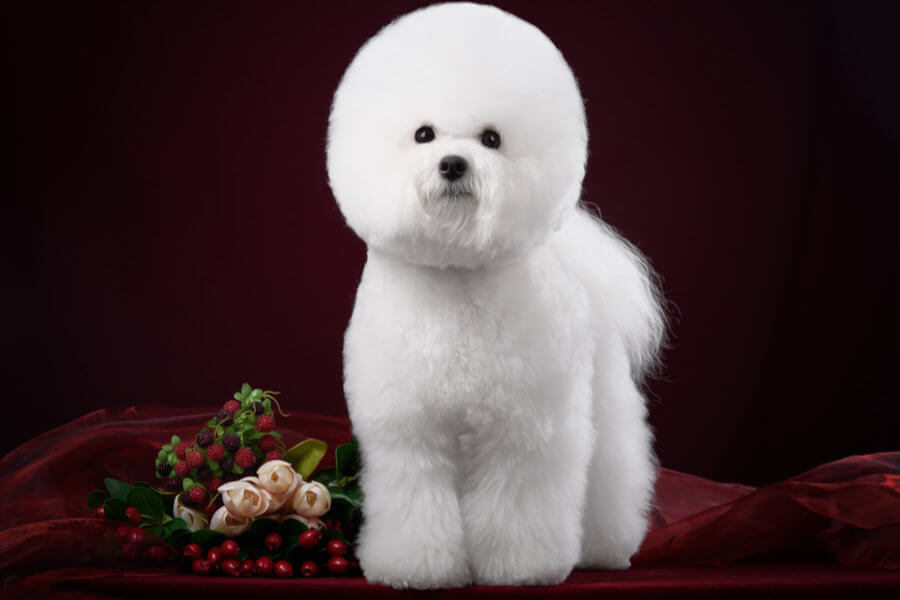
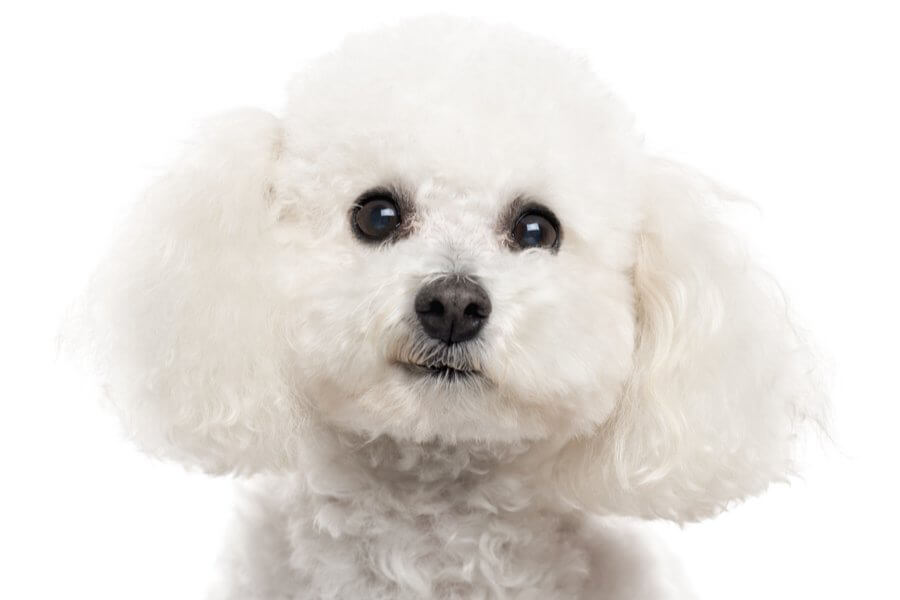
The Bichon Frise is known to have a long lifespan. However, like all breeds, they are susceptible to developing certain health conditions. You must purchase any puppy from a licensed breeder to ensure they have been well cared for and appropriately socialised. Your breeder will also perform DNA tests to see if there are any underlying health conditions present.
Some of the health concerns that affect Bichon Frise include:
Bichon Frise can be a great choice for families. However, it’s essential that you teach young kids how to properly handle and play with a dog. These dogs can be easily injured and they are also known to snap if play gets too rough. It is highly recommended that an adult always supervises any contact between a dog and a young child.
Bichon Frise generally get along well with other dogs and cats, especially if they have grown up together. But bear in mind that larger dogs will easily be able to overpower a small Bichon Frise.
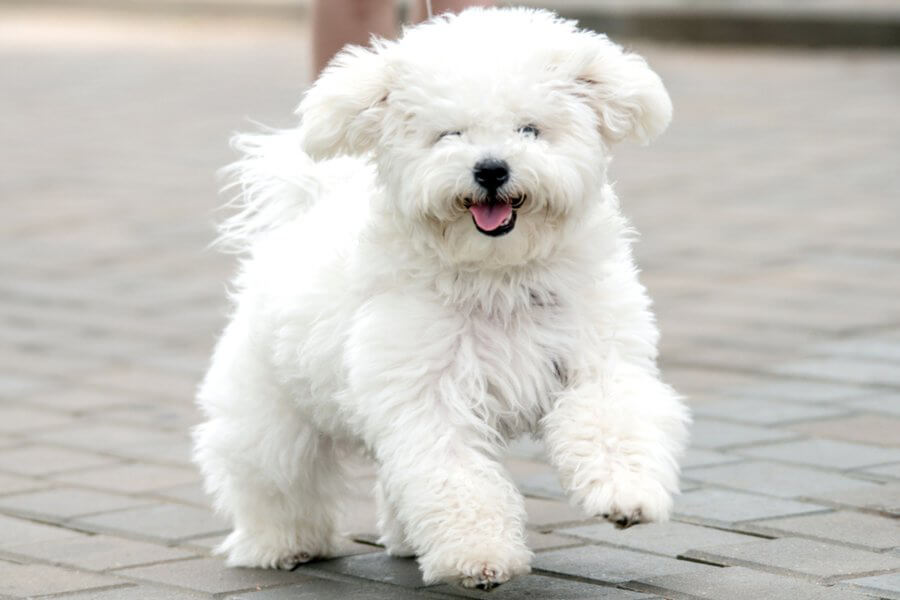
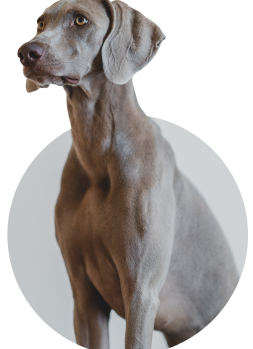
We can connect you with Breeders that are specialized in this particular breed.
See available puppies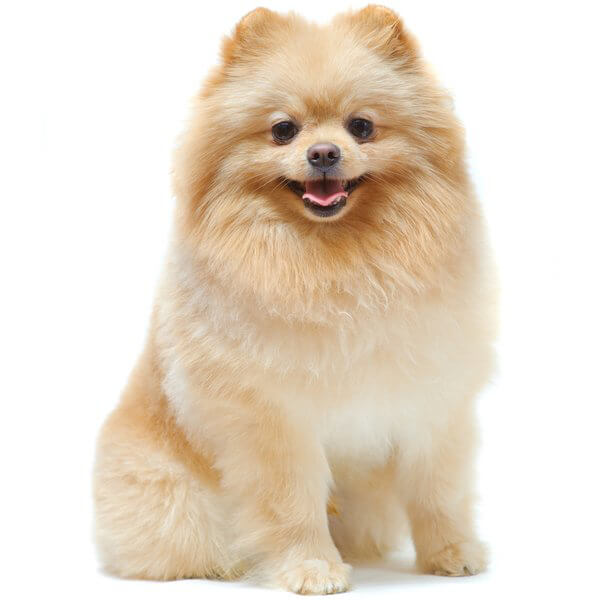
Germany
Size : Small
Coat : Long
Registration : KC, FCI, AKC
Exercise : 30 minutes
Training : Medium
Grooming : Twice a Week
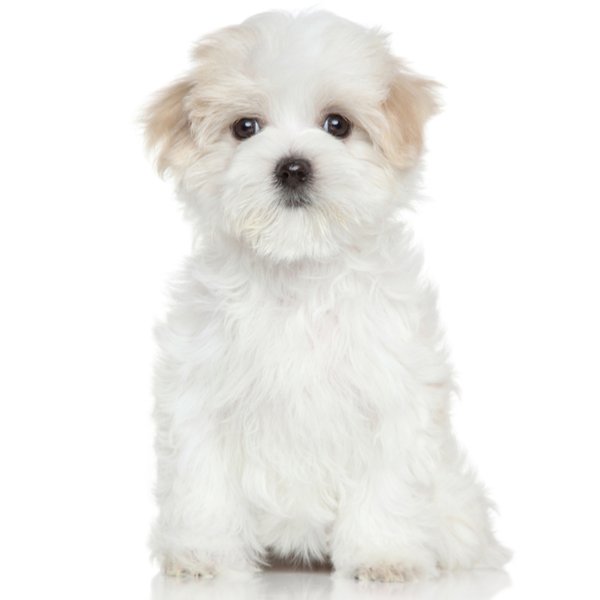
Malta
Size : Small
Coat : Long
Registration : KC, FCI, AKC
Exercise : 30 minutes
Training : Medium
Grooming : Twice a Week
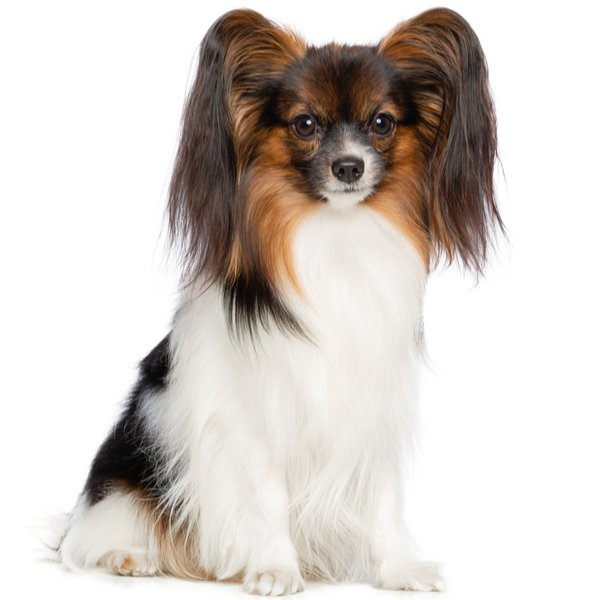
France
Size : Small
Coat : Long
Registration : KC, FCI, AKC
Exercise : 30 minutes
Training : Easy
Grooming : Once a Week
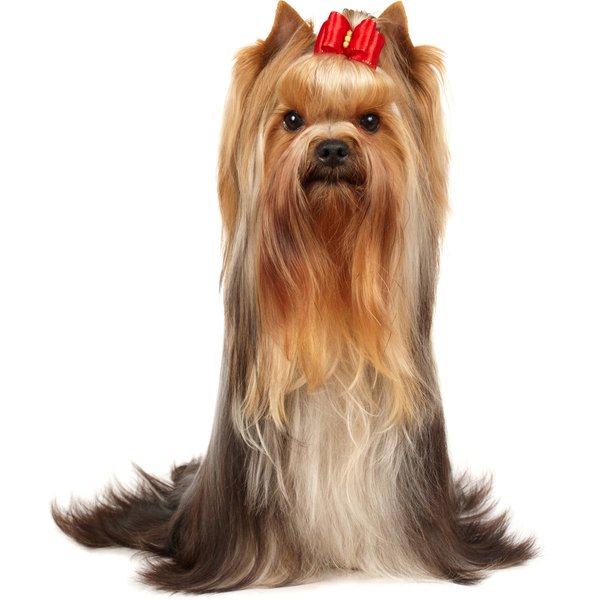
United Kingdom
Size : Small
Coat : Long
Registration : KC, FCI, AKC
Exercise : 30 minutes
Training : Easy
Grooming : Twice a Week


Need some advice?
Whether you're a first time pet owner, an experienced pet owner, a new or long-time breeder, or just curious about pets, we've got you covered!
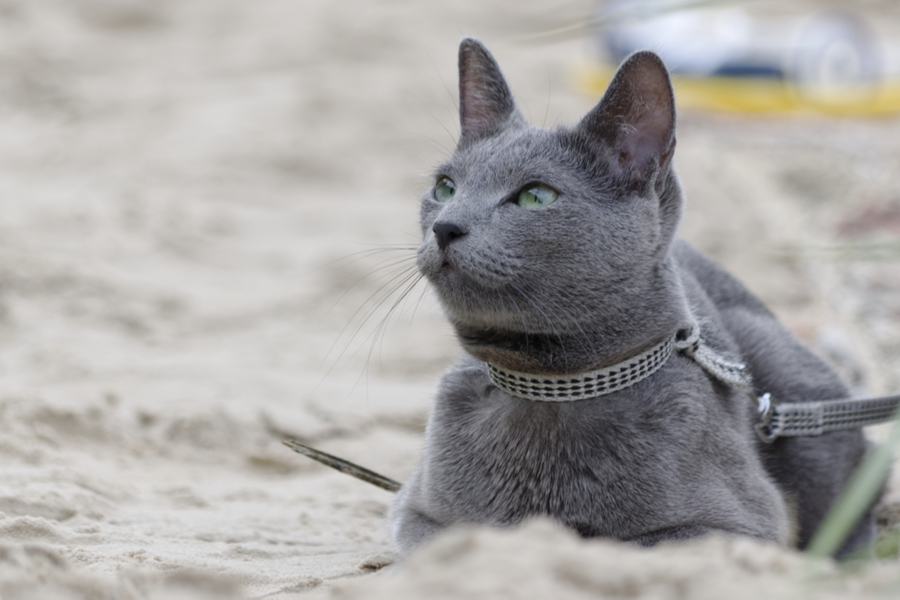
January 17, 2024
What Is The Personality Of Russian Blue Cats?
Russian Blue cats are most known for their distinctive shimmery blue-silver coat and piercing green eyes. However, this breed’s calm and gentle temperament is what makes them shine the most in the feline world.
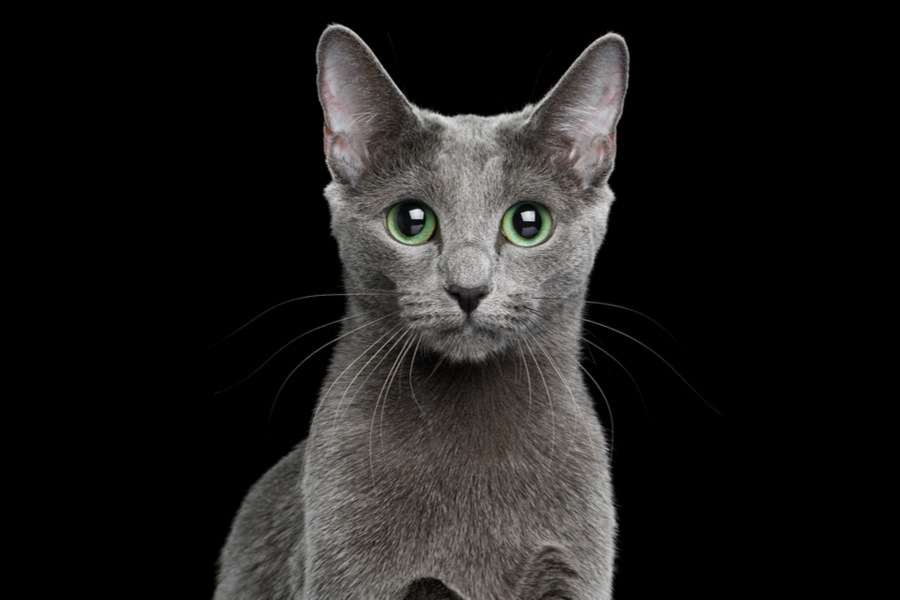
January 17, 2024
10 Facts About Russian Blue Cat Breed
Russian Blues are one of the most aesthetically stunning cat breeds, with a gorgeous plush silvery coat and vibrant green eyes. However, it’s not only their appearance that is beautiful; their nature is too.
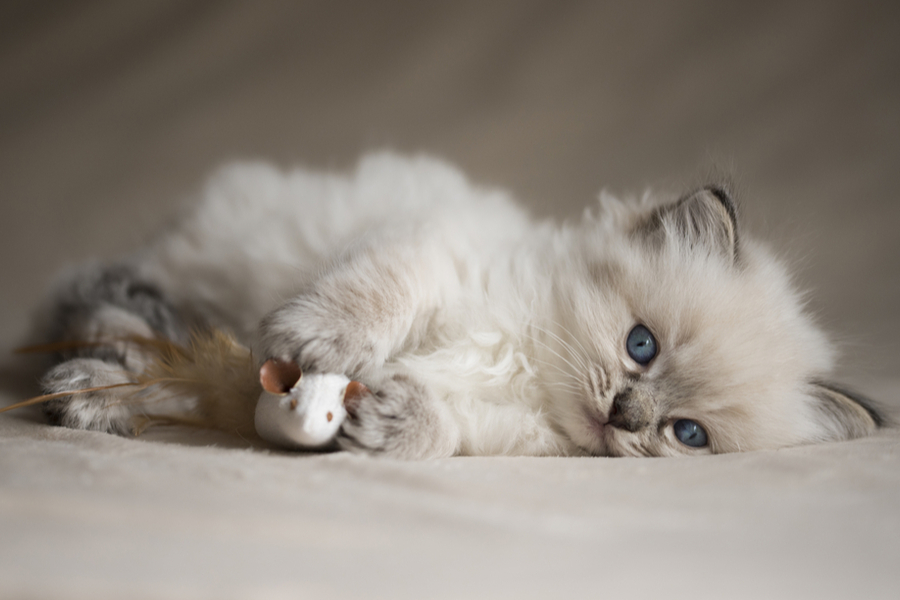
January 17, 2024
How To Choose The Right Cat Breed for You
Cats can make the most fantastic animal companions; they are adorable, friendly, and loving. However, not all felines are created equal. There are many different breeds, of which each has its unique personality traits.
Need some help?
Contact us to speak to our friendly advisor, who will gladly help you find your dream pet!



We are registered in England and Wales under registration number 12568840,
and our registered office is at 58-60 Kensington Church Street, W8 4DB London, England.
© 2023 The Pedigree Paws